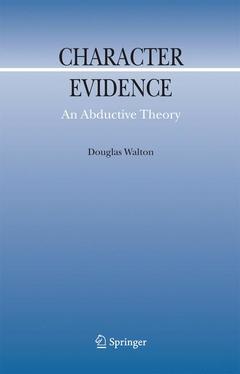Character Evidence, Softcover reprint of hardcover 1st ed. 2006 An Abductive Theory Argumentation Library Series, Vol. 11
Auteur : Walton Douglas

This book examines the nature of evidence for character judgments, using a model of abductive reasoning called Inference To The Best Explanation. The book expands this notion based on recent work with models of reasoning using argumentation theory and artificial intelligence. The aim is not just to show how character judgments are made, but how they should be properly be made based on sound reasoning, avoiding common errors and superficial judgments.
Brings state of the art tools of argumentation and AI to bear on a fundamental problem that has been highly controversial Anglo-American law.
An interdisciplinary approach that applies to many humanities fields, like history, where character judgments are central, providing a new kind of objective basis for evaluating these judgments
Provides a fresh new approach to the older positivistic viewpoint that tended to dismiss character judgments as purely subjective and even prejudicial
Expands the important notion of abductive reasoning yielding important new way of modeling evidence that has been regarded as highly problematic in the past
The author is well known as a leading interdisciplinary researcher whose work has spanned the fields of argumentation, informal logic, law and artificial intelligence
Date de parution : 11-2010
Ouvrage de 240 p.
16x24 cm
Disponible chez l'éditeur (délai d'approvisionnement : 15 jours).
Prix indicatif 105,49 €
Ajouter au panierDate de parution : 11-2006
Ouvrage de 240 p.
15.5x23.5 cm
